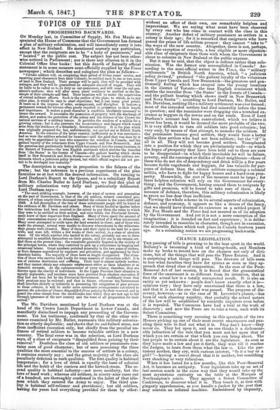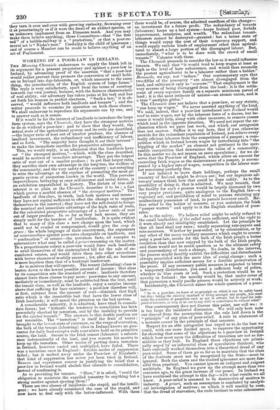CHANCE LEGISLATION.
THE passing. of bills is growing to be the best sport in the world. Bellamy's is becoming a kind of betting-booth, and Members make up books to record bets on the chances not only of divi- sions, but of the things that will pass the Three Estates. And it is surprising what things will pass. The drawers of bills seem to lose what faculties they have for syntax as soon as they ap- proach that dread class of composition. In the case of the Poor- Removal Act of last session, it is found that the grammatical force of the enactment is so different from its intention, that in fact the actual law is a totally unexpected result. It is also an entity as yet unknown : people don't know exactly what it is— opinions vary ; they have only ascertained that there is a law, and that it is not the one that was passed. The progress of dis- covery, however,—as in the case of M. Leverrier's planet,—has been of such cheering rapidity, that probably the actual nature of the law will be established by scientific inquirers even before it is repealed. The Commons have had a trial at the work of discovery ; and now the Peers are to take a turn, each with its Select Committee.
There is something very amusing in this spectacle of the two Houses picking up one of their most recent enactments and puz- zling their wits to find out what it is. They don't know—they never do. They bet upon it, and no one thinks it a dishonour- able infraction of the rule that you must not bet upon that of which you are certain or that which you can bring about. The last people to be certain about it are.the legislators. As soon as they have made a law and put it forth, they wait till it reaches the Judges, to learn from them what the law is. Like the par- turient mother, they cry, with curious interest, "Is it a boy or a girl? "—having a secret dread that it is neither, but something very shocking or very ridiculous.
When it has lasted for a few months, like this Poor-Removal Act, it becomes an antiquity. Your legislators take up an act of last session much in the same way that they would take up the most mysterious curiosity on the table at the Marquis of Northampton's soiree. They appoint a Select Committee of Cockletops, to discover what it is. They touch it, at first with gingerly apprehension, as you handle a packet by the post that may contain an infernal machine. Emboldened by impunity, they turn it over and over with growing curiosity, frowning over it as penetratingly as if it were the fossil of an extinct species, or an unknown implement from an Etruscan tomb. And you may make them believe anything, those Committees—that "the first sod" of a bubble-railway is a " prastorium," or that a poor-re- moval act is " Niobe's tear." Credulity is the child of ignorance ; and of course a Member can be made to believe anything of an act of Parliament.



























 Previous page
Previous page